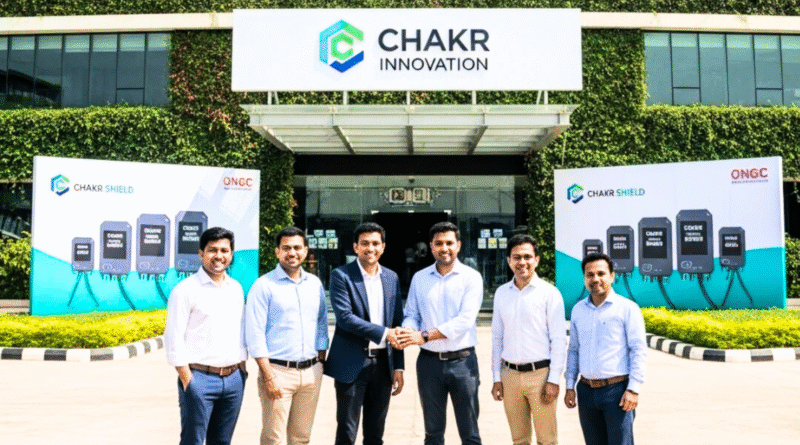Chakr Innovation Secures $23 Million in Series C: A Turning Point for India’s Deeptech Clean-Tech Sector
Date: September 24 -2025
Location: Gurugram, India
Chakr Innovation, a deep-tech company founded by IIT Delhi alumni and focused on clean technology and materials science, has raised USD 23 million (≈ INR 193.5 crore) in its Series C funding round. The round was led by Iron Pillar, with participation from existing investors such as SBI Capital Ventures (Neev Fund II), ONGC, Indian Angel Network (IAN), and Inflexor Ventures.
This infusion of capital is set to sharpen Chakr’s competitive edge in emissions control, energy storage, international markets, and materials science. The following is a detailed look at how Chakr reached this juncture, what it offers, and what lies ahead.
Company Profile
| Attribute | Details |
|---|---|
| Name | Chakr Innovation Pvt. Ltd. |
| Founded | 2016 |
| Founders / Leadership | Co-founders: Kushagra Srivastava (CEO) Arpit Dhupar Bharti Singhla. Key leadership includes Anmol Khandelwal (Executive Director – Emission Control Head), Vikram Qanungo (CFO), others in product development & production. |
| Headquarters and Manufacturing Facilities | HQ: Gurugram, Haryana. Manufacturing units in Gurugram and Pune. |
| Size & Team | Over 450 full-time employees, including 200+ engineers & scientists. |
| Patents and IP | Around 42 patent applications filed. Earlier product versions had several patents; in total about 35 patents (7 granted) for Chakr Shield etc. |
Funding & Financials / Funding History
| Round | Amount / Details | Investors / Notes |
|---|---|---|
| Series C (Sep 2025) | USD 23 million (~INR 193.5 crore) | Lead: Iron Pillar; existing investors SBI Cap Ventures, ONGC, IAN, Inflexor. Use: increase manufacturing, international expansion, backward integration, R&D in energy storage and material science. |
| Series B | Not fully disclosed; raised in November 2021 via SBICap Ventures’ Neev Fund II. | |
| Series A (2019) | ~ ₹19 crore (~USD 2.9 million) | Led by IAN Fund; other participants: Jyoti Sagar, IDFC Parampara Fund. Used to scale operations and expand to more cities. |
Financial performance (latest year, FY24):
- Revenue: ~ ₹124.8 crore
- Net profit: ~ ₹9.5 crore
Products & Services
Chakr Innovation has developed a portfolio of solutions aimed at emissions control, clean air, energy storage, and remote monitoring. Key offerings include:
| Product / Solution | What it Does | Key Features / Differentiators |
|---|---|---|
| Chakr Shield (RECD: Retrofit Emission Control Device) | A device retrofitted on existing stationary diesel generators (DG sets) to reduce harmful emissions (Particulate Matter (PM), Carbon Monoxide (CO), Hydrocarbons (HC)). | Up to ~80-90% reduction in particulate emissions; Type-approved by CPCB-recognized labs; minimal impact on generator performance; compatible across DG capacities; patented catalyst-based technology. Over 4,000-5,000 installations, ~2,000 customers. |
| Dual Fuel Kit | Allows DGs to run on a mix of natural gas and diesel (e.g., ~70% natural gas, 30% diesel), reducing fossil fuel emissions. | |
| DeNOx Systems | Emission control for nitrogen oxides (NOx) — used for industrial exhausts / gensets. | |
| IoT-based DG remote monitoring | For diagnostics, performance tracking and maintenance, ensuring compliance & operational reliability. | |
| Metal-Air / Aluminium-Air Battery Technologies | Alternative energy storage tech, using indigenous raw materials to reduce dependency on lithium-ion, possibly offering higher energy densities. Under R&D / early commercialization stages. |
Market, Impact & Metrics
- Installations & Customers: Chakr Innovation has over 5,000 installations and more than 2,000 customers across India.
- Emission Reduction / Environmental Impact: Claims of reducing ~2.5 million tonnes CO₂ equivalent emissions via its deployed solutions thus far.
- Regulatory / Compliance Context:
- India’s CPCB (Central Pollution Control Board), CAQM (Commission for Air Quality Management), National Clean Air Programme (NCAP), and State Pollution Control Boards are pushing for stricter emissions norms, especially in non-attainment cities. Retrofits for DG sets are increasingly being mandated or recommended.
- Chakr Shield obtained Type Approval via labs recognized by CPCB in 2022.
- Revenue & Profitability: FY24 revenue ~ ₹124.8 crore, net profit ~ ₹9.5 crore.
- Team & R&D: Over 450 employees; 200+ are engineers/scientists. 42 patent applications.
Leader Profiles
- Kushagra Srivastava, Co-founder & CEO
An engineer from IIT Delhi, Kushagra has led Chakr from its early R&D days, through product development, regulatory approvals, commercialization, and scaling. He has been vocal about materials science being strategic for India, especially under pressures in global supply chains. - Arpit Dhupar, Co-founder
Also an IIT Delhi alumnus, engaged in product innovation, especially in early emission control and sustainable materials. - Other Leadership:
Anmol Khandelwal (Exec Director – Emission Control), Vinod Bhoir (Production), Swati Devi & Abhijit Datta (New Product Development), Parth Sarthi (Product Management) among others.
Use of Series C Funding
Chakr has laid out clear strategic handles for this new capital raise:
- Scaling Manufacturing Capacity — Expand output, speed up production, improve unit economics.
- International Expansion — Enter new geographic markets, possibly outside India.
- Backward Integration — Build or bring in more elements of the supply chain in-house, especially critical materials, to reduce dependency and cost.
- Advanced R&D / Materials Science Centre — Specifically into indigenous energy storage alternatives (e.g. aluminium-air), critical materials, etc.
Opportunities & Challenges
Opportunities
- Rising regulatory pressure on emissions, especially DG sets in non-attainment zones under NCAP, which could drive demand.
- ESG / sustainability mandates among corporates, public sector, and real estate.
- India’s policy push for self-reliance (“Atmanirbhar Bharat”) in technology & critical materials.
- Growing global attention to air quality and climate mitigation technologies could open export markets.
Challenges
- Certification, approvals, compliance across different geographies can be laborious and time consuming.
- Ensuring performance across wide range of DG capacities, varying fuel qualities, and operating conditions.
- Competition from other emission control technologies and alternative fuels.
- Scaling indigenous energy storage is tough — materials, cost, durability, commercial viability.
FAQs
What is a Retrofit Emission Control Device (RECD)?
A device fitted onto existing diesel generators (DG sets) to reduce pollutants like particulate matter (PM2.5 / PM), hydrocarbons (HC), carbon monoxide (CO), often using catalytic or filtration technology. Unlike replacing the generator, RECD retrofits improve emissions from existing equipment.
How effective is Chakr Shield?
It reduces particulate emissions by over 80-90% depending on the model and installation. Also certified by CPCB labs.
Does using RECD affect generator performance or fuel efficiency?
No major negative impact. Chakr claims the Shield maintains generator efficiency and does not lead to significant increase in fuel consumption.
Is RECD mandatory?
In many non-attainment cities and under newer air quality regulations (CPCB / CAQM / NCAP), retrofits for DG sets are becoming required or strongly encouraged. Those not compliant may face penalties or sealing.
What are other Chakr products beyond Chakr Shield?
Dual Fuel Kit (mixing natural gas + diesel), DeNOx systems for NOx control, DG remote monitoring via IoT, and work on metal-air / aluminium-air batteries as energy storage alternatives.
What is the size of Chakr’s team and IP portfolio?
450 people in total; 200+ engineers/scientists. ~42 patent applications.
Why This Matters: Broader Implications
- Clean Air + Public Health: With 100+ million people in India exposed to unhealthy air levels (especially in winter), technologies like Chakr’s can make measurable improvements in PM2.5 and PM10 levels.
- Energy Storage Independence: Moving beyond lithium-ion (which often depends on imports for critical raw materials) could reduce supply chain risk and costs as demand scales.
- India as a Deeptech Hub: Success stories like Chakr support the narrative that Indian startups can do serious hardware, materials, and regulatory-heavy products — not just software / services.
- Climate and ESG: Corporations, governments, and financiers globally are aligning more with ESG / net zero commitments; Chakr’s solutions provide tools to meet those targets.
Revised Conclusion & Outlook
Chakr Innovation’s $23 million Series C is more than a capital milestone: it signifies that deep tech in clean technology is maturing in India. Chakr has already crossed key validation thresholds — product-market fit with thousands of deployments, regulatory approvals, meaningful emissions reductions, and a growing IP base.
The path ahead involves scaling with quality, innovating faster in materials-based energy storage, and expanding beyond Indian borders. If Chakr can successfully navigate regulatory, manufacturing and cost challenges, it may evolve into one of India’s climate-tech leaders, exporting not just products but clean-tech expertise globally.
Keep Reading:
- Titan Capital Launches Program for H-1B Visa Holders to Build Startups in India
- Fnality Secures $136M in Series C to Build the Next-Gen Global Settlement Network
- Nvidia’s $100 Billion Investment in OpenAI: A Strategic Move to Dominate AI Infrastructure
- Vedanta Limited: Company Profile, Business Overview, and Future Outlook
- CoreWeave’s $29 Billion Bet: Navigating the Debt-Fueled AI Infrastructure Boom




